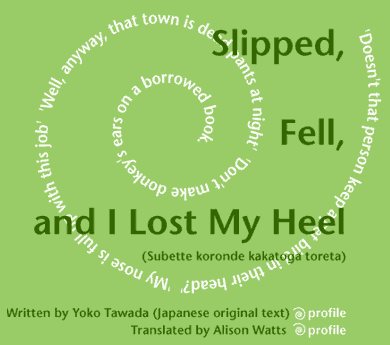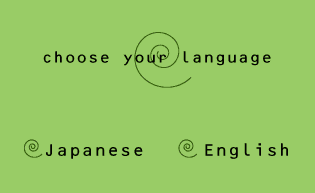|
|
space
space

I can still remember arriving in Hamburg in 1982 wearing sports shoes so worn out you could almost see through them. I had bought these white sports shoes for 500 yen in Takadanobaba on the day I handed in my graduation thesis, and worn them out walking through India and Yugoslavia, so that by the time I arrived in Germany they had become like a skin on my feet. German people, in comparison, all protected their feet with solid shoes. I started my life there with an uneasy feeling.
In eighteenth-century Japan many people are said to have believed the rumor that Dutch people didn't have heels, but what drew my interest when I arrived in Germany was not the feet, 'the substance', but the shoe encasing them that was 'the skin'.
The day after I arrived in Hamburg I started work for a German book agency and exporter. One by one, expressions quite commonplace for Germans were automatically translated into Japanese inside my head and built up a nonsense world: 'Doesn't that person keep a pet bird in their head?'; 'My nose is full up with this job'; 'Well, anyway, that town is dead pants at night'; 'Don't make donkey's ears on a borrowed book.' (You can make whatever you like of these.)
Half a year went by without my speaking any Japanese at all. It felt like the Japanese language had become detached from my life. Even the things I could touch with my hands, as well my moods - I just didn't find the right words for them in Japanese. It was probably natural that German, a foreign language to me, should not feel right, but becoming separated from one's mother tongue was frightening, like being in a fog and gradually not being able to read words anymore. Wordless, I came to feel things, think and make decisions. (There are probably people who would say this is impossible, but there's no other way to put it.) Naturally, writing novels was the last thing I could think of doing. Even in my diary, when I read now what I wrote back then, there are lots of places where I cannot understand the meaning. These symptoms sometimes appeared in my letters, too. I once sent a photo home that I had taken in India, but because I'd written the caption 'stray dog', it seems my family worried that I'd finally lost my senses. Because it was plain for anyone to see that what was in the picture was a pig walking along the street, not a dog at all. I cannot remember now whether that was because I made a mistake with the characters for 'dog' and 'pig', or whether my definition of the word 'dog' had shifted (for example, whether I unknowingly created the definition that a dog is an animal which loiters on the street), or whether it was that the word 'like' in the phrase 'a pig like a dog', just slipped out of my thoughts.
In time, I came to 'translate' this life without words into German and Japanese. It was as if the Japanese I had used in the past had died and been reborn in another shape. Although such Japanese might well be thought strange, I could not write about the world I saw without it when I worked on "Missing Heels", for which I received the Gunzo Prize for New Writers last year [1991].
"Missing Heels" postulates my contradictory feelings that there are no people without heels, and that even without heels, people are able to lead brilliant lives. I wanted to write a novel without heels. This is not literature which wanders freely, ignoring the traditions influencing one, however. Literature without heels is, I believe, literature which is unpredictable and looks like it is perpetually about to tumble precisely because it is standing on its toes. And people who look like they are about to tumble are far more interesting to me than those who have their feet firmly on the ground.
Now and then I accidentally overhear the conversations of Japanese travelers at a train station, for example, and there are times when their manner of speaking sounds terribly artificial to me. I don't quite know how to adequately express this feeling, but it sounds just like an English class where students are practicing conversation with memorized dialogue. I wonder if everyone lives out their lives talking in such a manner. Perhaps the words 'natural' and 'unnatural', 'skillful' and 'awkward' are discriminatory terms. There are no grounds for saying one kind of Japanese is natural and beautiful, and anything else is no good. Isn't it all right for Japanese to be spoken and written in a completely different style? Especially if it more nearly approaches the experience of the people using it in their lives, including foreigners living in Japan or Japanese living overseas. At any rate, I felt that it was impossible to write the things I wanted to in ordinary Japanese. You could say that it was as a result of this feeling that a novel without heels was born.
It was around the time I had just arrived in Germany that I became conscious of the artificiality of their conversations, which also resembled my sense of the artificiality of Germans talking together. Often it sounded to me as if business discussions, quarrels and lovers' talk, were just like a playscript being read aloud. Sometimes, to an outsider's eyes, other people's lives appear to be a fiction. My second novel, "Relations Between Three People", was written while thinking about this, and although set in a place 'like' Tokyo with a narrator 'like' a Japanese, in fact it might also be the literature of an outsider.
Originally published in Japanese in Eureka Magazine and subsequently published in a collection "Katakoto no uwagoto" [TALKING IN THE BROKEN LANGUAGE OF SLEEP] by Seidosha. All Japanese-language rights reserved by Sedidosha.
English translation by Alison Watts by permission of the author and Bookport International. All rights reserved. This text may not be reproduced in whole or in part, by mimeograph or any other means, without permission. For information address: Bookport International, 429 Third Street, Brooklyn, NY 11215, USA.
|
|



